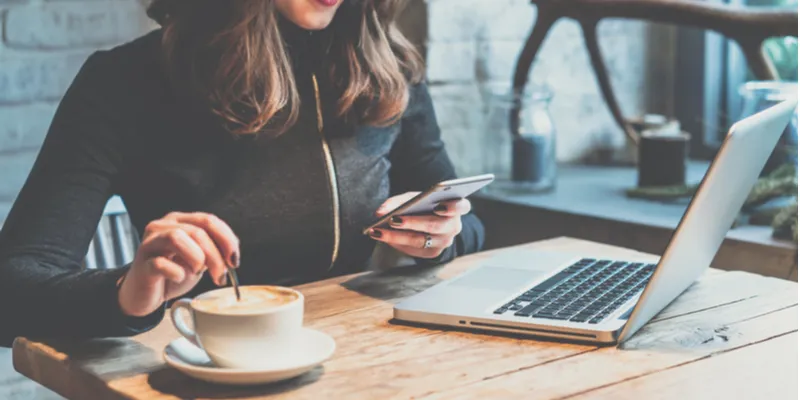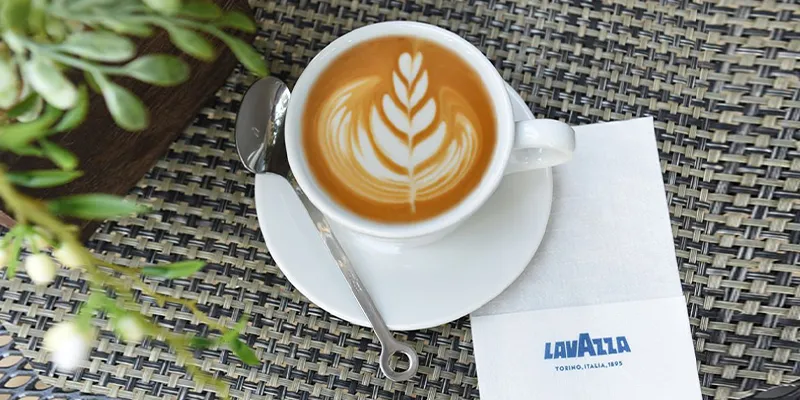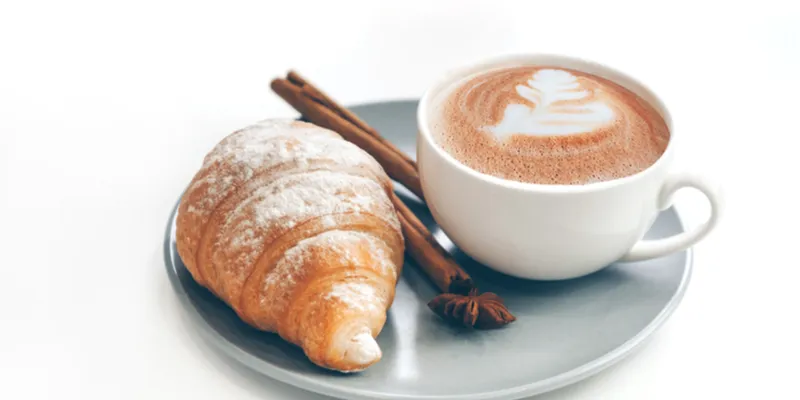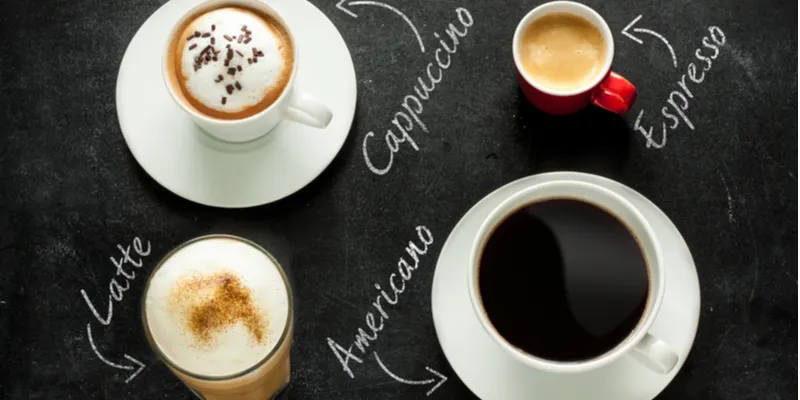What’s brewing? Survey shows a new coffee culture during the times of coronavirus
Are you missing your coffee breaks in your office with your colleagues? According to a survey done by the coffee brand Lavazza, most office-goers feel the same. Here’s the new coffee culture of our times
For some it is café au lait, replete with creamy milk and warm foam that makes their mornings sparkle with happy vibes. For others, it is a deep, dark Americano, a frothy Cappuccino or a milky South Indian filter coffee that does the trick. Whatever the chosen cuppa of brew, it is coffee that brightens the day, helps form bonds among co-workers and sets the right note for the week at an office.
Now that the COVID-19 lockdown has brought an end to all regular office days, many office-goers miss those coffee breaks with their colleagues where they forgot about work for a few minutes before they got back on the bandwagon.

Chat with your co-workers over coffee via electronic screens
With the lockdown entering its eighth week, a lot of people across the country are facing withdrawal symptoms without that first cuppa in the morning with their colleagues. This caffeine fix in the absence of social connections seems to be having quite an effect on those working from home and has pushed them to connect with people virtually to make this happen, so that they share a cup of morning coffee via a computer screen.
Here’s what some head honchos have to say:
Ankita Taksande - Assistant Vice President, Howden Insurance Brokers India Ltd.
“A cup of black coffee is an integral part of my work life. On days when the work is crazy and I have to manage multiple people and paperwork in order to get the work done, it’s the right make of my coffee that helps me get through it.
If you have been drinking coffee for as long as I have, you can tell by the first sip in the morning how the rest of the day is going to look like. I like my morning cup of black coffee prepared in a particular manner which is rare for the office coffee machines to make. Hence, I brew my coffee at home and carry it to work. It helps me realign my thoughts and productively get through the day.
With this pandemic, we are all going through tough times. Ever since the lockdown, my 3 pm coffee has become a ritual where I brew a cup of black coffee. It gives me the additional push to replenish the drop in efficiency post-lunch and get me back to speed to complete all the daily tasks.
Prasad Shejale - Founder & CEO, Logicserve Digital
“For me, coffee time at work is a way to relax, take a break and a way to connect with team members while engaging with them in a candid conversation. One can’t replace the human connection and the bond built over face-to-face interactions during coffee breaks.
Chetan Mahajan – Founder & CEO, The Mavericks India
We are trying to stay connected now as well in the best possible way through virtual visits. My productivity is proportionately linked to my workout sessions and my favourite brewed coffee(s). With both boosting factors disappearing from the scene it’s been hard to keep the productivity levels high while the work hours have become longer the overall productivity has gone down, particularly when coupled with lack of face time with the team members and clients. Can’t wait to get back to the coffee sessions with the team.
A coffee survey carried out by coffee brand, Lavazza shows that the brew is more than a beverage for most people as they see it as a productivity enabler in the office.

Jai Ganesh Ramnath
In order to find out more about coffee and its popularity, YSWeekender caught up with Jai Ganesh Ramnath, Managing Director, Lavazza India, the company that conducted the survey. As the managing director of Lavazza India, Jai Ganesh heads the businesses across India & SAARC region.
In our interaction, Jai discusses the findings of the survey, the different kinds of coffee in the world, why they are so popular, the new coffee culture in the country and more….
Edited excerpts from the interview:
YSWeekender: What has your survey on coffee drinking habits revealed?

Coffee is a productivity enabler for many office-goers
Jai Ganesh Ramnath: With offices and cafes shut across the country since the lockdown, we all have been missing out on socialising with our colleagues and friends over a cup of coffee.
We decided to conduct a week-long survey titled “Productively Brew-ding” among Indian millennials and the Gen Z population to understand how this population set is currently coping with social distancing, particularly while working from home.
As a result, the survey results show that the respondents’ relationship with coffee goes beyond it being just a beverage; they see coffee as both, a productivity enabler to churn out those extra hours of work, and a companion if they decided to take a break, any time of the day.
YSW: How is the coffee culture in India different from the one abroad?
JGR: India still remains a tea-drinking nation, with coffee consumption habits primarily concentrated in the southern parts of the country including, Tamil Nadu, Kerala, Andhra Pradesh and Kerala. However, this is still low when compared to the global consumption patterns. Having said that, we’ve been noticing an interesting rise in inclination towards coffee culture and a shift in mindset especially among millennials.
In one of the surveys which we did earlier this year titled “Brewing Conversations”, we wanted to gather some insights around how millennials relate with coffee; as a motivator or a companion. We had over 3000 millennials respond to this survey from across India.

People rely on coffee to keep their spirits up
We noticed that while almost 50% of the millennials find coffee as their morning motivator and a whopping 94% chose coffee as the apt drink when they were going for an interview, the overall results were quite interesting. A significant 69% of respondents considered coffee to be a companion, while only 31% consider it to be a motivator, which is contrary to popular belief that coffee would primarily be seen as a motivator for a lot of us.
Our “Productively Brew-ding” survey shows another interesting pattern, keeping in mind the ongoing lockdown. With over 5000 millennials and Gen-Z responding to this survey, 40% rely on multiple rounds of coffee in order to be productive while working from home and 60% of these respondents also relied on coffee to keep their spirits up and wind down after a hectic day filled with work and chores.
YSW: What are the different kinds of coffee that are popular now?
JGR: The most popular variety of coffee beans are Arabica and Robusta, which are most produced worldwide. Arabica coffee is very aromatic, fragrant, sweet and slightly acidic and today makes up two-thirds of the world's coffee production. Robusta, on the other hand, is stronger and constitutes one-third of the world's production of coffee.
This variety has a distinctive body enriched by chocolate notes and a persistent aftertaste. These are the primary variants of coffee that are cultivated across the world for regular consumption.
There are also different ways for brewing a barista-worthy cup at home which is easy and affordable - like the french-press, Aero-press or a pour-over, for a great cup of black coffee.
YSW: What is the most loved coffee?
JGR: In India, we love to wake up to a smell of freshly brewed coffee; especially in South India, a strong cup of filter coffee is the preferred way to kickstart your mornings. During the day, cappuccino is the most loved, be it while socialising with a friend or even while attending work meetings.
In fact, our earlier survey titled “Brewing Conversations” found that 70 % of millennials would choose cappuccino as the source of their comfort while on a date with their significant other.

A survey shows millennials would choose cappuccino over all other types of coffee
Nowadays, Indians are becoming more adventurous and prefer to try different styles of coffee. Surprisingly, there is an increasing inclination toward non-milk coffee beverages especially amongst millennials, cold brew being one of the emerging coffee trends.
YSW: What kind of coffee does Lavazza specialise in?
JGR: Lavazza has been mastering coffee blends since 1895. It specialises in roasted beans for espresso blends, pure filter coffees and capsules. In India, Lavazza is a key player for the production of roasted beans. We also make capsule coffee machines which produce a coffee shop quality coffee with every cup.
We take pride in our coffee blends as they are the coffee roaster’s secret recipes. Created by mixing different types of coffee to create a unique and unmistakable aromatic profile, blending is a process aimed at creating different flavours and intensities, while maintaining a constant quality.
Our blends are produced by using speciality and premium grade green coffees, sourced from high elevation regions. Adding to that the roast profile is performed using German technology roasting system which gives coffee a better taste.
Lavazza entered the Indian market in 2007 but has now consolidated its presence in the retail branded coffee, café products as well as in the coffee machines segment. Lavazza, founded in Turin (Italy) in 1895, has been owned by the Lavazza family for four generations. As one of the world's most important coffee roasters, the Group now operates in more than 140 countries through its subsidiaries and distributors, with 70% of turnover generated on international markets.
YSW: Why does India not have a same kinds of coffee available abroad?
JGR: India is one of the top coffee producing countries globally, with a vast variety available. It also is the fifth-largest exporter of coffee in the world. Indian coffee is said to be the finest coffee grown in the shade rather than direct sunlight anywhere in the world.
In fact, we produce some of the world`s best specialty grades like Monsoon Malabar and Robusta Kaapi Royale. Almost 80% of the coffee produced in India is exported of which 70% is bound for Germany, Russia, Spain, Belgium, Slovenia, United States, Japan, Greece, Netherlands and France. Italy accounts for 29% of the total exports.
Due to various restrictions around importing coffee in large amounts, we have limited varieties of international brew. However, Indian coffee estates produce some of the best coffees and we are delighted to use them in our blends which are loved by coffee lovers worldwide.
YSW: What do you see as the future of coffee in our country?
JGR: India is one of the youngest countries in the world. With increasing awareness amongst the youth, with their love for travel and social media, we see increasing interest from prospective consumers in knowing the “how” of coffee. The younger generations want to know more about where the beans are sourced from, how they are ground, different ways in which coffee can be consumed etc. When you club this with the rise of restaurants and cafes, the study indicates a strong future and, appreciation and demand for fine coffees in the coming years.








